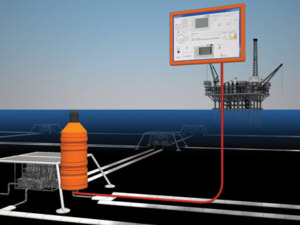|
AUV-borne leak detection system inspects Mediterranean pipelines
Nov. 05, 2015 + + + Following extensive offshore trials,
Co.L.Mar’s acoustic leak detector (ALD) has completed its first deployment
from an autonomous underwater vehicle (AUV) for inspection of pressurized
pipelines.
The system’s main components are an underwater acoustic sensor which
acquires data along the pipeline; a transmission line relaying data to the
surface vessel; a hardware receiver; and software that assesses the signal
in real time and its progression along the tracked pipeline. Originally
the technology was designed for deployment from a towfish or ROV, but
during 2013-14, a prototype ALD for installation on an AUV completed
successful trials in a test pool and on a non-pressurized offshore
pipeline.
This year, the operator decided to adopt the same configuration for
planned maintenance of pipelines serving an oil and gas field in the
Mediterranean Sea. One of the main attractions for the client was cost,
according to Co.L.Mar’s managing director Luigi Barbagelata. Unlike an ROV
an AUV does not need to be deployed from a specialist vessel in DP mode.
In this case it was operated from a local supply boat.
The ALD was used in two separate campaigns: one on two pipelines with a
total length of 20 km (12.4 mi) during May/June and the other on various
pipelines with a total length of 21 km (13 mi) during August/September. In
addition, the AUV undertook all conventional survey tasks, including
free-span and cathodic protection inspection. “In one case,” Barbagelata
said, “we finished ahead of schedule while in the other there was some
delay due to bad weather. With a bigger ROV, however, the cost would have
been much higher due to the need to need to keep the DP vessel on standby.
The survey was conducted both in autonomous and in remotely operated mode
- in the second case, data was acquired in real time on the supply boat
via a fiber-optic link used to control the vehicle.”
During 2014 Co.L.Mar also staged trials in a test pool for a deepwater
operator to determine whether the ALD could be used to detect a leak
causing ingress of water into a pipeline. As the industry moves toward
development in ever deeper water, there is potential for a leak inside the
pipeline if the external pressure is higher than the internal pressure.
However, traditional inspection techniques are based on detecting only
fluid coming out of a pipe.
“We designed and produced a system that comprised a piece of pipe
connected to other pipes pressurized from the outside, in order to
generate inward leaks ranging in diameter from 0.5-5 mm, with pressures
from 2-100 bar [29-1,450 psi]. The trials simulated scenarios for both
liquid and gas-filled pipelines. The acoustic signals generated by the
leaks were very clear and detectable. Results were very promising as it
proved the applicability of passive acoustic technology.”
Source: Co.L:mar - www.colmarsrl.com
|
 Worldwide more than Worldwide more than
100,000 paid subscriptions
Since May 2015
Oil, Gas &
Petrochem (OG&PE) is published as part of the
OIL & GAS
JOURNAL to serve a consolidated monthly audience of 135,000 oil/gas professionals worldwide
»
read more |

Worldwide
more than 48,000 subscriptions -
100% one-year direct request
qualification

'What's New' in Upstream, Midstream and
Downstream Products & Services. Circulation 37,000
PennWell
Petroleum Group:
Oil & Gas Journal
Oil & Gas Journal Russia
OGJ_eNewsletter
OGJ-Website-Statistics
Oil, Gas & Petrochem Equipment
Offshore Magazine
Offshore
Russia
Offshore eNewsletter
Offshore
Website Statistics
Oil & Gas Financial Journal
+ + +
For more information, media
kits or
sample copies please contact
Andreas
Sicking
+49 (0)2903-338570
wilhelms@pennwell.com
www.sicking.de
|


